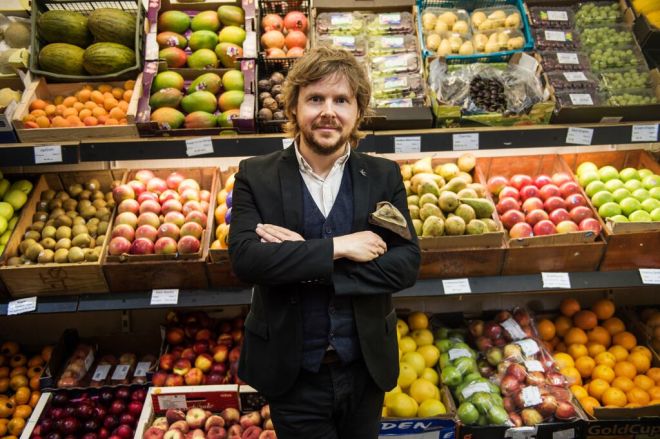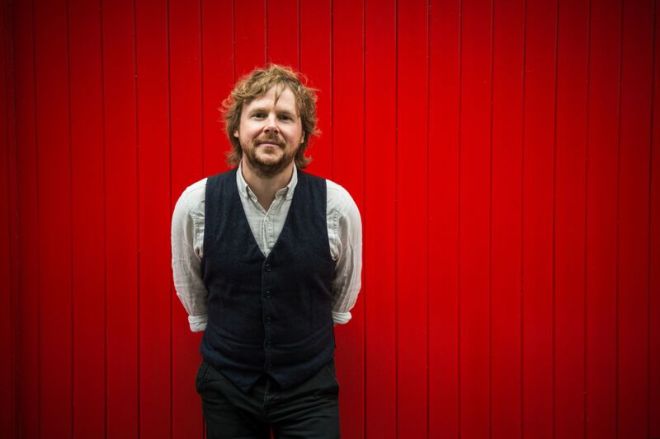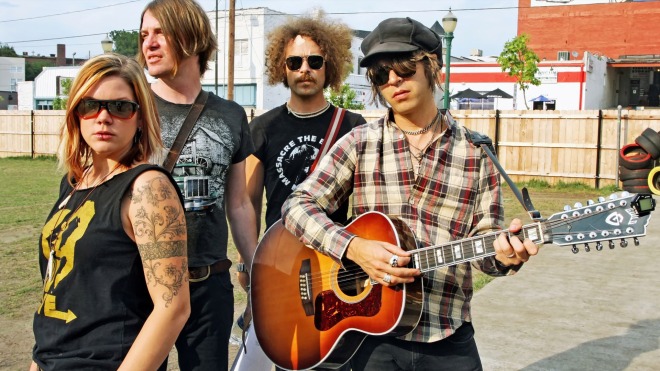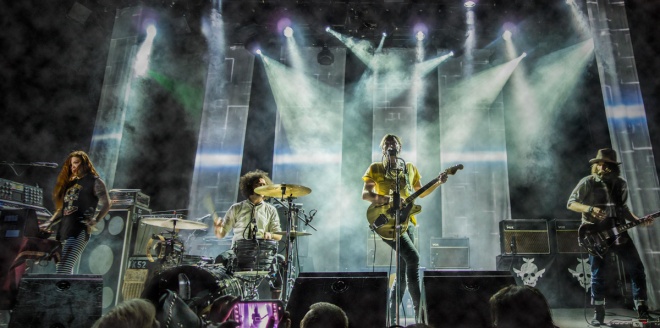The Specials’ Terry Hall: “Things haven’t changed over the last 30 years, which is really sad.”

Originally published in the Irish Sun on June 8, 2012
The riots and looting that engulfed London and England’s other major cities last summer may have petered out as quickly it broke out, but for a generation of English songwriters it was all too depressing a sight.
For Terry Hall – frontman of the recently reunited ska punk act the Specials – it was confirmation that, for all the good will and idealism that lay behind classic polemics like the Clash’s ‘Guns of Brixton,’ the Smiths’ ‘Panic’ and his own group’s hypnotic ode to urban degeneration ‘Ghost Town,’ politics and economics beat music every time.
“The idea that it was the thirtieth anniversary of ‘Ghost Town’ almost to the day and there were people rioting in the streets of London is very, very sad. It sort of shows how powerful music isn’t, do you know what I mean?
“Things haven’t changed over the last 30 years, which is really sad. We never really set out to change things, just to make people aware of things, and we’re still doing that now. We’re doing it a lot quieter because we’ve aged, but that’s still the intention.”
The Specials’ stint at the top of the charts was disappointingly brief. The simmering tension that produced their two classic albums – 1979’s The Specials and 1980’s More Specials – reached extreme boiling point in the Top of the Pops dressing room after a performance of ‘Ghost Town’ and they went their separate ways.
Chief songwriter Jerry Dammers attempted to keep the band on the road following the departure of Hall, Neville Staple and Lynval Golding. The leftfield classic ‘Free Nelson Mandela’ notwithstanding, it was a doomed enterprise, and the three departed members went on to form the creditable splinter project Fun Boy Three.
The group’s iconic status and romantically short recording career ensured there were numerous attempts made to tempt the original line-up back to the recording studio, but as it turned out it took 25 years and a serious illness to convince Hall and the other band members (with the exception of Jerry Dammers) to once again sit in the same room.
“What changed was my attitude towards everyone in the band. I went through quite a serious illness and when I came out the other side I just wanted to kind of put things right in my head, and one of the things was being in a room again with the people that I grew up with.
“We only ever really wanted to reform to do one gig, and that grew out of all proportion really. Once we’d looked at each other and decided to do a gig we just carried on from there. I didn’t really want to do it for the sake of it. We were always being offered stuff over the years but I didn’t see a point until the point where we got in a room and we got on again as mates.”
He notes how time has helped heal old wounds without entirely closing them: “I think we’ve learned the art of self-control, which is quite good. There is still tension there. We don’t get on all of the time, and if we have a grievance we’ll air it, like a band should really.
“There are definite areas where we don’t agree on still, and that comes out, but I think that also comes out in our music and I think that’s a good thing, really. I don’t trust bands who get on. You need a certain tension to make a good group.”
That tension continues to filter out in the band’s live performances, and Hall feels the group’s essential message of social and racial inclusiveness is no less relevant and vital to today’s audiences as it was 30 years ago.
“We’re still relevant, but it’s totally different now. We were one of the first mixed band when we formed. If you look at stuff like the Equals, or even Thin Lizzy, it was quite rare. Now it is less so, but I think our songs still hold a relevance.
“I think things just change shapes. There’s been really brilliant integration in England between the West Indian and Asian communities over the years but it wasn’t so in the Seventies and that’s part of fuelled what we did. Racism still exists, but now it’s more likely to be the Eastern Europeans who are used as scapegoats, which they are. So it still exists, and that’s what our songs talk about and comment on.”
Another explanation for the group’s enduring relevance is that, with very few exceptions, there is little appetite among mainstream musicians today to address social issues in their music the way groups like the Specials, the Clash and the Smiths did at the turn of the Eighties.
“I just think the whole music business changed, really. The desire to make those sort of records just went. With the advent then of ‘talent TV,’ people want to be famous, really, and that was never a reason why we started a band.
“We just wanted to try and find a voice, but I don’t think that’s on the top of the list for any artist today. If you search, you still find stuff that you can understand and relate to, but the whole industry has changed so much. With the internet, I think people are being more political on that than they are in making music.”
As the band descend on Cork for the first time in three decades, the seemingly neverending tour that has taken them all over the world in the past four years has done what it set out to do, and Hall says the time is approaching where they need to either record new material or go their separate ways.
“We’re now at a stage where we’re thinking we’ve done really what we set out do, which is great, and we’re sort of mates again in a way. So what else is there to do? And that’s what we’re looking at now, really.”
The Specials play Live at the Marquee in Cork on Monday, June 11.
Fight Like Apes: ‘We’ve had messages from people asking are you still going?’
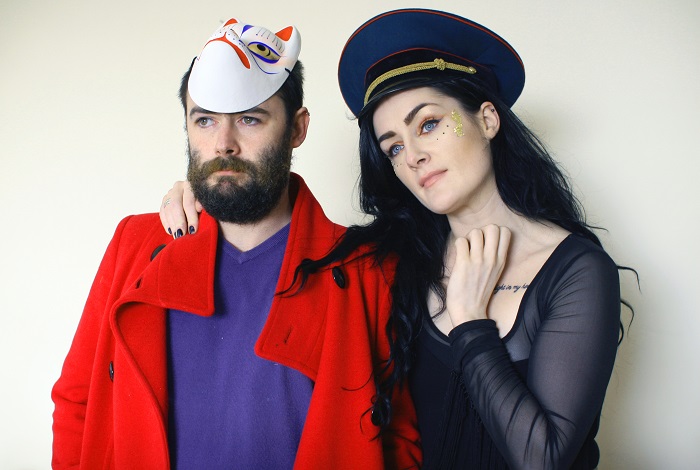
The phrase ‘out of sight, out of mind’ is one that rings true for a lot of artists who’ve gone long periods without releasing material, and it can be a struggle to recapture the same level of interest after such a lull.
For Fight Like Apes, the five-year gap between the release of their second album, The Body of Christ and the Legs of Tina Turner, and today had the opposite effect – the longer they stayed away, the more people wondered where they were.
Speaking in advance of the release this week of their self-titled third album, frontwoman May Kay (née Mary-Kate Geraghty) told Something for the Weekend: “We’ve had messages from people saying ‘are you still going?’
“We’ve really deadly fans who would almost get annoyed at us for not releasing something, which initially makes you go ‘fuck, give us a minute,’ but then you think is really deadly.
“You do have people getting really annoyed, going ‘what hell, you’ve released two EPs and two albums and now nothing.’
“You can’t get annoyed with that – you have to be grateful for people being that annoyed. Our big concern was that we’d lose those people and at the moment I don’t feel like we have.”
Rather than launching the album in the traditional manner with a run of dates around the country, the band who once performed onstage inside a wrestling ring have instead opted to re-introduce the element of a spectacle.
This weekend will see the band perform three dates at Charleville Castle in Tullamore – the location of Castlepalooza – and will bus fans in from Dublin, Cork, Belfast and beyond for the night which, if nothing else, should provide a different mix of fans than the average gig.
“We really want to do something special to remind people of what it is that we love and what it we want to do, which is make the gigs a little bit more special every time we do it.
“People are asking if we’re still going, and we wanted to make sure people knew that we absolutely were. It’s just taken us a fucking while to get going.
“We did an EP last year with Alcopop Records, with ‘Crouching Bees’ that’s on the album. It was just a little ‘hey, we’re still here!’”
The past five years have seen changes both internally and externally for the band, having ended their association with their record label and the temporary whittling of the band down to just founding members Geraghty and co-frontman Jamie Fox.
The result is a record that was completely self-produced (Lee Boylan, who co-produced their early EPs, is now a member of the band) and self-funded, in part through a successful FundIt drive that allowed them to finance the release.
It’s also, feels Fox, a return to the freedom of spirit and ethos that infused those early EPs and forced major labels to sit up and notice a small electro-punk band who sang about characters from obscure 1990s sitcoms, and have since matured to singing about characters from successful 1990s sitcoms.
“We didn’t go over for a month somewhere to record it this time,” he says.
“We recorded it with our own equipment, begging, borrowing and stealing whatever we could get and getting out anywhere we could whether it be Granard or Thomastown, or places like that randomly over Ireland.
“It took such a long time because we recorded everything on tape and it was very difficult to get everything we needed on the budget we had.
“We put a lot of work into it and got it mixed by an artist we wanted to work with, Ash Workman, who we really wanted to have it mixed by.
“It just felt like after a few albums of having a producer, we wanted to take the reins and prove we can make a better album than just going over for a month to somebody just because they have a good name.
“Often that’s not how you make a good album – the production should come from the same place as the songwriting and be as artistic as the songwriting.”
Geraghty concurs: “It’s true – it’s a really weird thing when you look back on this thing that is so individual and so you, and then you’re just handing it over to somebody else to produce.
“When I listen to any of those EPs – which we have done – we were thinking in terms of what we valued releasing and what sounds good as opposed to what would do well. We have to think about what it is we’ll be proud of.”
Fox adds: “It was getting back to that dynamic where we felt like knew better than everybody again, whereas after the first EPs we were like ‘Jesus, everybody seems to like this – we’ll take it up a level and work with a big-name producer.’
“He did a great job but maybe it wasn’t the record we wanted to make at the time. I can’t even remember if it was.”
The split with their record label was an amicable one, but also recognition that the relationship wasn’t working for them creatively or financially.
“They wanted a hit album – they needed a hit album,” says Fox. “They had two albums that did well to a certain extent but they wanted… their act at the moment is Hozier and we were never giving them that!”
Geraghty adds: “It was a pretty basic communication breakdown. Both sides wanted different things and there was no room for compromise – they would have had to compromise financially or we’d have to compromise creatively, and neither of us were willing to do that.”
The end-result, they feel, is a record that feels right for them. It may fail to live up to expectations, but if it does they’ll be able to stand over it.
“We wanted to not blame anybody – not that there’s anything to blame anybody for – but with our first album, people who liked the EPs said ‘oh, it’s just overproduced.’ And then the second album, ‘well that’s underproduced.’
“This one is whatever it is – it’s not overproduced and it’s not underproduced, it’s just what we wanted to make.”
Fight Like Apes is out now. The band play a matinée show in Whelan’s on Saturday afternoon, and will play three dates at Charleville Castle from May 21st to 23rd.
Barry McCormack: ‘After 20 years you’d imagine I’d get tired of writing about Dublin.’
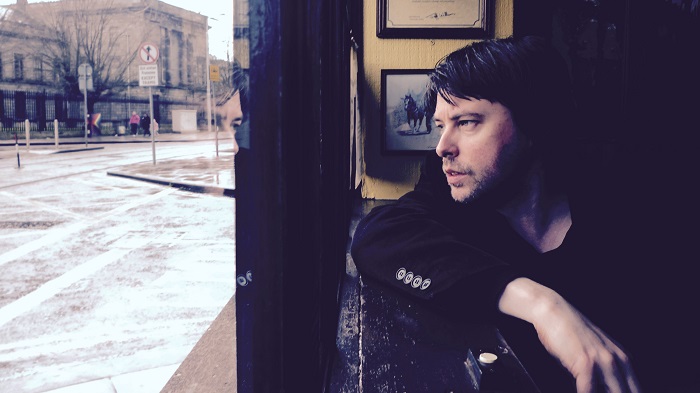
For over two decades, Barry McCormack has been casting a critical eye on his hometown of Dublin.
First with his band, the Jubilee Allstars, and latterly with his six solo records, McCormack has been scathing of the city’s ills and celebratory of its charms.
Yet at no point, not even after taking a year out to live in Paris, has he gotten tired of commentating on the city from which he was thrust.
His sixth album, The Tilt of the Earth, is set for release this week and, for McCormack, its charms and intricacies remain the perfect setting for the more universal themes contained in his music.
“After 20 years you’d imagine I’d get bored of it,” McCormack tells Something for the Weekend.
“There’s an American crimewriter, one of the guys who wrote for the Wire, who said if you’re a crimewriter you have to ‘find the city and own it.’
“A lot of crimewriters, Dashiell Hammett in San Francisco, Raymond Chandler in LA, if it’s somewhere you understand it’s somewhere you can tell stories about.
“I spent a year living in Paris and after living in Paris, I realised I could never write songs about Paris. I don’t understand the people – it’s foreign to me.
“It’s a cliché – write what you know about – but I’ve never really stopped finding Dublin an interesting place to write about.
“You can write really universal things about from a local place. I think that’s obvious if you [read] Dubliners.
“If you read Dubliners, it’s explicitly Dublin, but the themes are universal. Not to be too pretentious and drop Joyce into the mix, but it’s an example of something local being universal.”
And while Dublin has that fantastic tradition, passed down through literature and song and the spoken word, it was one of the great London-Irish from whom he took particular inspiration.
While there’s scarcely a street or a landmark in Dublin that hasn’t had a canon of songs written about it, more often than not it’s tended towards celebration rather its tawdry underbelly.
Even famous songs like the Monto – written about Dublin’s infamous former den of misery and prostitution – comes out sounding as jolly as a day at the Galway Races.
Whereas, for McCormack, he was as interested in the city’s flaws as its plus-points.
Songs like ‘Guests of the Nation’ and ‘Do You What It Is, Sir, to Have No Place to Go?’ tackled anti-immigrant sentiment before it had even registered on many Dubliners’ radar.
“If you think of MacGowan, he wrote London in the Dark Streets of London, the Old Main Drag, etc.
“The Pogues are seen as an Irish band but they’re not really – they were a London band. He was a psychogeographer of the underbelly of London.
“Fortunately MacGowan didn’t write about Dublin, so I could write about Dublin and be influenced by the way he wrote about London.
“There was a tradition of Dublin street songs, and you go back to Zozimus, the guy who used to stand on the street corner and sing songs or read poetry about Dublin.
“Dublin is small as well so maybe it’s easier to have a connection. Maybe it’s a cliché, but if you go into Grogan’s there’s a connection to people who used to drink in McDaid’s, and that whole Baggotonia, you know Kavanagh and Flann O’Brien and stuff like that.
“This is a bit facetious, but a friend of mine always says ‘why do you always write about Dublin?’ And I say, if I was from Huddersfield I’d probably write about Huddersfield.
“Some people are like that. The guy who wrote V for Vendetta, Alan Moore, is he from Huddersfield? [He’s from Northampton].
“He’s kind of obsessed with his local area. Some people are inspired by local geography and things like that. It’s probably a mixture of those songs.”
A Tilt of the Earth, by contrast to his earlier records, is a somewhat more serene affair, both musically and in terms of its lyrical content.
The furious narratives of old are replaced by more neutral, perhaps more mature, descriptions of events like the Liffey Swim.
The presence of producer Stephen Shannon – who produced McCormack’s two previous albums – is particularly prominent, as McCormack notes it’s his most collaborative record to date.
It was Shannon, for instance, who prompted the complete re-working of lead single ‘All the Things You’ve Done’ from a jaunty alt-pop song to an altogether more dark piece.
“The first song on the album sounded like Teenage Fanclub and Steve wasn’t liking it at all.
“So we took everything off it except a banjo and he put down a sampled drumbeat and we rebuilt the song from that.
“He put on a bunch of Seventies synth sounds and a harmonium drone, so the song is completely different to how it was originally.”
“The best production I did on the whole record was when we decided to get a trumpet player in but I couldn’t go to the sessions because I had to work make the money to pay for it.
“When I turned up to the playback, Steve had done everything I would have wanted him to do, so I said to Steve: ‘the best production I did on this record was not to turn up to the session.’”
Musically, it wouldn’t sound out of place alongside some of Bob Dylan’s more mellow recent material – much of the album puts one in the mind of Dylan’s Time out of Mind album.
Which is no surprise, given that Dylan is another of McCormack’s key influence and another, like himself, who has been praised for the literary content of his musings – albeit by the somewhat loftier Nobel Committee.
“I’m a bit confused because I think it’s great that a lyricist got [the Nobel Prize].
“You can definitely argue that songs are not literature because they’re meant to be read, but Dylan is literary. It’s almost a semantic thing.
“There’s this Norwegian writer called Karl Ove Nausgard who said he was happy but Cormac McCarthy, Philip Roth and Thomas Pynchon haven’t won it yet and probably should have got it first. And I wouldn’t disagree with him.
“People dismissing it, like as someone said ‘it’s like giving McDonalds three Michelin Stars, I think that’s rubbish.”
The Tilt of the Earth is out now. McCormack plays a launch show in the Conservative Club in Dublin tonight, October 21st.
Charles Bradley: ‘I am the Victim of Love, because I love everybody.’
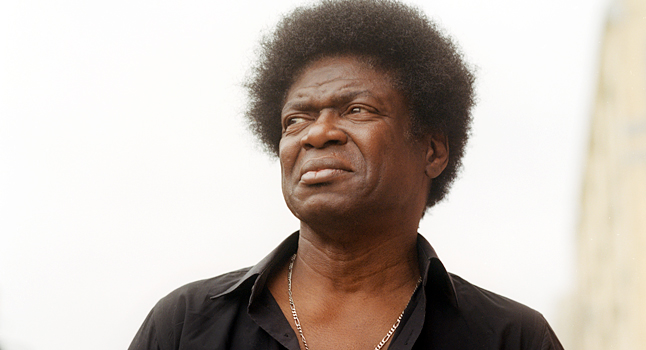
A Victim of Love.
Originally published in the Irish Sun on June 14th, 2013.
It’s said that soul is the music of struggle and of overcoming deep hardship – and nothing could be more true when it comes to Charles Bradley, whose journey to the top has been longer and more challenging than most.
It’s not so much the 64-year-old’s age that is surprising, but the fact he only released his first album a mere two years ago. 2011’s No Time For Dreaming marked him out as ferociously talented, gritty soul singer, but it’s with his new record Victim of Love that Bradley looks set to kick onto the big time.
Speaking to Something for the Weekend ahead of his performance at next weekend’s Body & Soul festival, Bradley mused: “I called this second album the Victim of Love because I believe through all my trials and tribulation, that I am the victim of love because I love everybody.
“I get no joy from hurting no one. If I can’t give you nothing good for yourself, I ain’t going to tell you nothing at all.”
Bradley’s biography is not one for the faint-hearted. A poverty-stricken childhood – he didn’t meet his mother until he was eight – gave way to a drifter’s life as an adult.
The one thing that kept him on course was a tightly-held belief that good things come to good people.
“I never gave up because I know I always had a dream,” he says.
“They always say be true to your dreams. Don’t give up –even though it’s very shady, you never know who can come and find you. I believe that Tom Brenneck is the one who found me.”
Tom Brenneck is Bradley’s producer, band leader and writing partner who, along with Daptone Records founder Gabe Roth, Bradley credits with bringing his lifelong dream to pass.
Roth discovered Bradley as he toured the New York club circuit as Black Velvet, a fitting title for a James Brown impersonator.
“James Brown and I came from the same era and the spirit that he got and his hardships as a young man, I’ve been there too. That’s why I can relate to him.
“I’ve always in life picked the hardest thing to do because I wanted to master the hardest thing to do, and that’s why I chose James Brown to do.
“When I saw him in the Apollo, the things that he did, I said this is what I want to learn from.
“You learn from the greatest teacher that you know, and for me James Brown was the greatest thing out there doing his music. I learned to master his music, now I let it rest and I go and do Charles Bradley.”
Bradley’s wider influences are slightly more surprising. He confesses to a deep love for the music of Barbra Streisand (“nobody sings ‘Memories’ like she can”) and credits the Eagles with, quite literally, saving his life:
“Take it to the Limit’ by the Eagles – man, when they sung that song, that actually saved my life. I was going through a deep depression at the time – I was looking for a way to get out of this body of mine because I couldn’t take the pain in those days.
“It’s not the creed or colour you are, it’s what you carry in your heart and soul. I say, don’t judge a book by its colour, judge it by the content of its heart.”
Charles Bradley plays the Body & Soul festival in Co Westmeath on Saturday June 22nd.
The Irish Sun’s Top 10 Albums of 2015
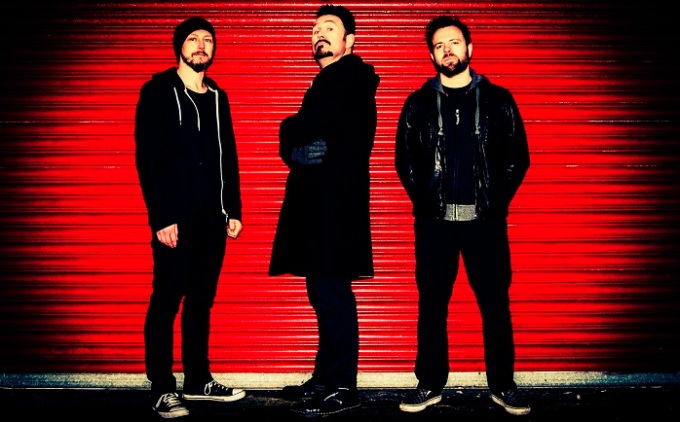
Therapy?
Therapy? – Disquiet
“The whole point of it was supposed to be the protagonist from [Troublegum] looking back,” Therapy? frontman Andy Cairns told Something for the Weekend upon the release of Disquiet, 20 years out from its iconic predecessor.
“That’s the kind of strand of Therapy that we could make every album like. It’s in our bloodstream. I don’t know what it is, because we grew up listening to Big Black, NWA, punk bands from Ireland and US hardcore bands.”
The Belfast-bred trio’s fourteenth record is, on the face of it, derivative by design, but it’s clear despite the opening bars of Still Hurts – which channels Troublegum’s first track Knives – that Disquiet is an update rather than a rehash, and it’s as vital a record as they’ve made in a decade or more.
Explicitly and implicitly, Diquiet challenges the notion that rage and self-loathing are preserves of the young, and tracks like Good News is No News and Idiot Cousin rank among the very best that one of Ireland’s most inventive and under-appreciated rock bands has produced.
Le Galaxie – Le Club
Overnight success rarely happens overnight – to put a spin on the annoying cliché – and it’s certainly true in the case of Le Galaxie, who were all set to release their second album independently when they discovered their progressed had been carefully followed by Warner Bros.
The Dublin electro-pop quartet spent more than half a decade developing into the complete package so coveted by major labels, cultivating a substantial following through a thrilling live show and honing their sound to the point where the album replicates the same euphoria.
“Our live shows are all about getting the crowd into it and dancing around. We really wanted to catch that joyousness on the album, and that’s why the album has that very positive, summery vibe,” guitarist Anthony Hyland told SFTW during the summer.
In contrast to their introverted, sci-fi-inspired debut Laserdisc Nights II, Le Club bristles with club-friendly chorus and a relentless energy encapsulated by the title track and Put the Chain On, and the group’s New Year’s Eve outdoor show in Dublin’s Stephen’s Green promises to bring a fitting end to the band’s momentous year.
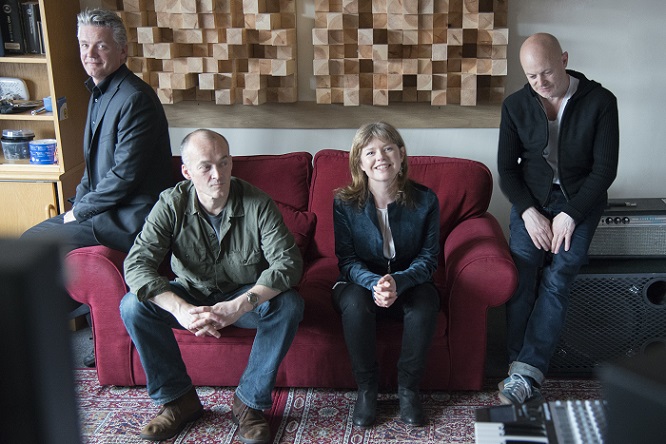
The Drays
The Drays – Look Away Down Collins Avenue
Anybody lucky enough to have lurked around the independent music scene in Ireland during the late Eighties will have fond memories of the Stars of Heaven, one of a plethora of Irish bands of the era who hold the curious distinction of never having achieved the lasting success the esteem in which they’re held suggests.
The Stars had the ear and the backing of the great John Peel, who was captivated by frontman Stephen Ryan’s keen pop sensibilities and distillation of that laid-back, Burrito Brothers-style California rock vibe.
With his latest project, the Drays, Ryan draws on similar influences, heightened by the sharing of vocal duties with Eileen Gogan, and tracks like You Say the Same Thing Twice neatly complement the more abrasive Crazy Horse-inspired rock sound of The Fourteenth Floor and The Seven Years War.
New Order – Music Complete
Before the release of Music Complete late in 2015, most music fans could have been forgiven for thinking New Order had ceased to exist. It had been 10 years since the band’s last proper album, and longer still since they’d been any good, and Peter Hook’s acrimonious departure in 2007 had appeared to spell the end of the direct lineage of Joy Division as a creative force.
Without their ever-present fulcrum Hook in situ, expectations for Music Complete were muted across the board but, in spite of the less-than-whelming contributions of Iggy Pop and Brandon Flowers, it’s the best thing the band have done since the Eighties, with Hook’s replacement Tom Chapman a particularly positive influence.
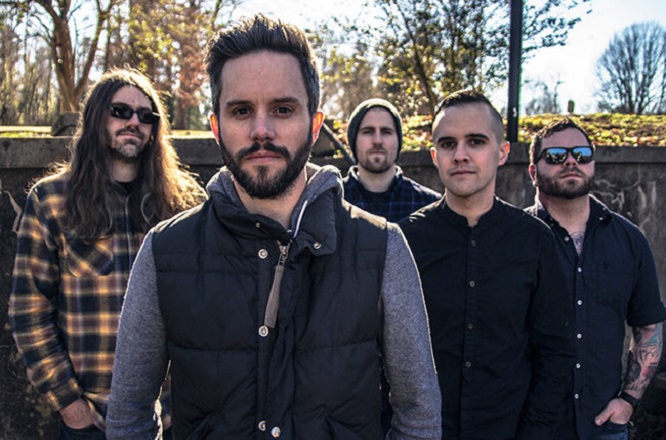
Between the Buried and Me
Between the Buried and Me – Coma Eliptic
Prog rock has never been to everyone’s tastes – and 50 years down the line it may never be – but what’s good enough for the dear departed Lemmy should be good enough for all of us, and in Between the Buried and Me prog possesses one of the great heavy metal bands of our time.
The Tommy Rogers-fronted band are a much-changed beast from the aggressive and pathologically difficult band that produced the masterpiece Alaska, but their move into more accessible and saccharine textures has breathed new life into the formula, and Coma Eliptic is the pinnacle of their latter-day work, an album that proves dense and challenging music can be catchy and euphoric at the same time.
Lakker – Tundra
If Lakker is an unfamiliar name to many, even within Dublin’s small electronic music scene, it’s one that is increasingly making waves in the wider world of techno. Dara Smith and Ian McDonnell have been plugging away for over a decade, first as part of the Prodigy-aping Undermine and later as a duo, but it’s with the aptly-titled Tundra that they’ve found their sound, a stark and somewhat standoffish whose dense layers only begin to reveal themselves with repeated listening.
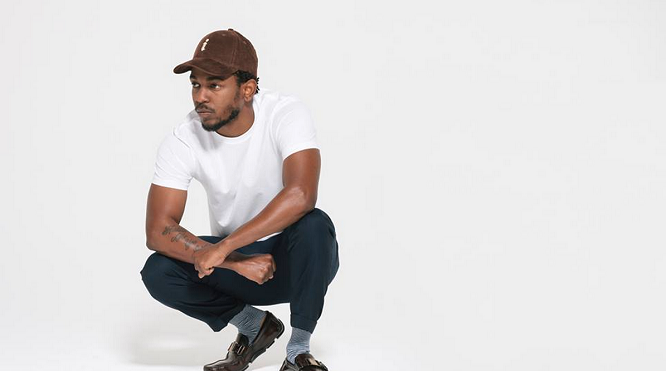
Kendrick Lamar
Lamar Kendrick – To Pimp a Butterfly
Rarely a year passes when a black artist doesn’t capture the imagination of predominantly white mainstream audiences with a style steeped in the old school hip hop, with just enough bite and self-confidence to thrill said audiences without alienating, whether it’s the brash egotism of Kanye West or the juvenile vulgarity of Odd Future. What is unusual is for an artist to handle conservative old-style rap with the respect it deserves while adding something unique and lasting to the canon, and to those ends the now-veteran Compton rapper has achieved something remarkable.
Colm Mac Con Iomaire – And Now the Weather
Dubliner Colm Mac Con Iomaire is best-known for his association with Kila and the Frames but the Gaelgóir violinist has many more strings to his bow. As the ironically dismissive album title suggests, And Now the Weather is something completely different for Mac Con Iomaire, in that he intentionally shied away from making a fiddle album, written primarily on an old family piano inherited in recent years. In contrast to his first record, it’s a collaborative affair featuring many of the musicians he’s worked with over the years, but the cinematic, almost post-rocky feel to the album is a success owed purely to the artist himself.
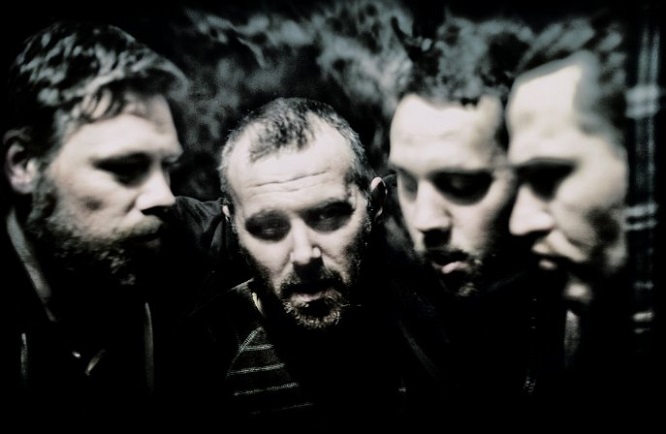
Leo Drezden
Leo Drezden – Multi-Moment
With the demise of Adebisi Shank and the Redneck Manifesto’s continued hibernation, there was a danger the east coast of Ireland might cease to be the epicentre of post-rock, an unimagineable thankfully unimagined by the return of Enemies and the emergence of Leo Drezden. Featuring Rian Trench – half of cinematic electronica act Solar Bears and brother of Enemies’ Oisin – Leo Drezden fuse mathy instrumental rock with Trench’s sci-fi soundtrack-influenced synth production, and excellent musicianship abounds on their impressive debut.
Jape – This Chemical Sea
Ireland’s foremost adopted Swede Richie Egan produced the first great Irish album of 2015 with January’s This Chemical Sea, taking the concept of pollution – of the environment, of the body, of the soul – as inspiration for an album that’s as much a commentary on consumerism in the modern world as it is a cautionary tale on the dangers of drink and drugs, all contained within the electronic-backed folky sound that has made the Dubliner one of Ireland’s most recognisable modern musicians.
‘It took me ages to fall in love with music again…’ – An Interview with Oliver Cole
“I’m like some sort of lovesick fool on this record,” says Oliver Cole, only half-mockingly, as he pores over the details of an album that almost didn’t see the light of day.
It’s been a scarcely believable five years since the former Turn frontman released his first solo offering, the intriguingly-titled We Albitri, with outside eyes expecting the Kell band’s cult notoriety to transfer through to its architect’s new undertaking.
It never quite turned out that way, however, as We Albitri became bogged down in music business politics and, by the time it did see the light of day, much of the optimism and enthusiasm had been sucked from the endeavour for Cole.
The experience left the softly-spoken songwriter chastened, and he freely admits the whole experience led to his confidence taking a real beating, to the point where, having completed Year of the Bird, he couldn’t quite bring himself to put the wheels in motion to release the record.
“When I finished Year of the Bird I didn’t send it to any music business people,” he tells Something for the Weekend.
“I don’t know what I was expecting. People would ask ‘when’s the record out?’ and I’d say, ‘oh, the end of the year.’ I’d been saying that for the last two years, but at the same time I didn’t send it to a single person.
“Pete [Murphy, Cole’s promoter] says I sent him a copy but it was a blank CD. I don’t know what I was expecting.
“I think I was making music a long time and, if I’m really honest, I think I was a bit disappointing with how my last record was received. It made me retire into myself a little bit. I certainly wasn’t confident about putting this record out.”
The gradual decline of Turn – the all-too-familiar story of a prodigious and retrospectively iconic Irish band whose time passed amid record industry messing – had left him disillusioned to start with, and subsequent events only deepened his disappointment.
“There were a lot of complications I had at the time with managers and labels – music business stuff mostly that took me ages to get that first ball up in the air after Turn.
“It took me ages to fall in love with music again, and it took me ages to get the ball up in the air, and as soon as I had it up in the air, fucking everybody around me was dropping the ball.
“I got very disheartened and beaten down by the whole process. And it’s different when you’re by yourself.
“When you’re in a band, you take the knocks better. When you’re three or four people people, they’ll stay standing when someone punches you, but it’s just you when someone punches you, you just go dead! Then it takes everything you’ve got to get up again.”
The character Cole depicts couldn’t be more in contrast to the contented figure who sits singing melody lines to songs, both his own and others, and liberally sprinkles the conversation with the word ‘beautiful’ while describing an album inspired by meeting his partner and welcoming his first child to the world.
While Year of the Bird has the sound of an introspective record – one that shares the same sonic space with the likes of Villagers – deeper investigation reveals an album steeped in both positivity and invention, as Cole shies away from the conventional guitar and drums set-up to experiment with harmony and structure.
“I think it is [an uplifting album]. Lyrically, there is a lot of trying to figure stuff out, but it’s moving in a very positive direction.
“What’s funny about that is that the last record, five years ago, the one that sounds on the face of it very positive is lyrically very dark. It’s funny that, because this one sounds a little darker but lyrically it’s quite beautiful and poetic.
“I’ve always been interested in that. If you take ‘Help!’ by the Beatles, and you wrote it out on a piece of paper, it’s desperately sad, but put it to [sings the melody] and it’s not sad at all!
“If you have really lovely music, and you put a lovely melody on top of it and really lovely lyrics, you’re in danger of making somebody throw up. You have to be careful not to over-ice the cake.”
In that sense he has a kindred spirit in Glen Hansard. The Oscar-winning songwriter joins Cole on one of the album’s standout tracks, the Paul Westerberg-evoking alt-country ballad ‘Magnolia,’ which Cole admits Hansard had to strong-arm him into including on the record.
“I was touring with Glen and he happened to really like that song, ‘Magnolia,’ and he would get me up at the end of his gig… he’s a very gracious host, is Glen.
“He’d get me up at the end of every gig and go, ‘Oliver played support earlier and I didn’t see him because I never like to watch the support because I get nervous – is it OK if I bring him out now to do a few songs?’ And they go, yeah.
“Then I’d come out, and he’d just leave the stage in the middle of his gig, and I’d do two or three songs, then he’d come back on and we’d do this song ‘Magnolia’ together, and he’d sing harmony and play electric guitar.
“We did it every night on that tour, about 20 or 30 gigs, so basically by the end of that tour it had developed into something quite beautiful.
“When I came home, I didn’t really want to put it on the record – and I struggled a little bit because I didn’t think it suited the sound of the record in some ways – but Glen was really persistent.”
Originally published in the Irish Sun on July 31st, 2015.
“Music has given me more salvation, and more hope, and more joy in my life than everything else in the world put together.” – An interview with the Dandy Warhols’ Courtney Taylor-Taylor
Portland rock veterans Dandy Warhols are enjoying somewhat of a purple patch in the past 18 months, and are back in Ireland for the second successive summer to headline Indiependence in Mitchelstown, having starred at Bundoran’s Sea Sessions last year.
This summer’s extended jaunt, frontman Courtney Taylor-Taylor tells Something for the Weekend, is largely on the back of ‘Chauncey P vs All the Girls in London,’ a single the band unexpectedly dropped in February, ostensibly to let people know they were still alive.
“We shred, we’re amazing at guitars – that’s our thing – vocal harmonies. [It was just to] re-lay it down and put it out there that we rip. It was also just to get the phone to ring, you know?
“[It was] for labels to call up and be interested and to have producers and big mixers, and it did – it got the phone ringing.
“We have a lot of people we’d like to work with that, if we didn’t have anything out, wouldn’t call us back, or maybe not bother listening to an mp3 of something we were working on. You just have to do stuff.
“We got a lot of festivals going, ‘woah, this band is amazing.’ We’re getting a lot of calls still to play festivals and have a great super party summer on the heels of just releasing one song. One song now, and the 20 years of rock that came before it.”
Taylor-Taylor speaks slowly and thoughtfully in a distinctive deep voice, occasionally losing his train of thought as his speed of mind outpaces his lazy west coast American drawl.
He reveals the band are well on their way to recording album number nine, the follow-up to 2012’s This Machine, though anybody expecting anything soon is likely to be disappointed as the band – particularly the singer – are sticklers for detail in the studio.
“We’re cranking the bigger parts of the machine up again. I think next year will be a big year for us. We have nine or ten songs more or less complete at this point.
“It’s going to be a lot of work, but we should have a record out next year, it looks like.
“We own probably one of the coolest studios in the world, or ever, and we like to be there. We party there, we work and we record, and we do stuff all the time, and you get these songs.
“We build them to where they are nearly as perfect as we can make them. That’s sort of how our lives go. A lot of revolving around the studio.”
He describes the band’s mode of operation as more akin to a group of painters planning an elaborate artwork rather than a typical rock band – in the studio at least.
“Zia [McCabe, keboardist] and Pete [Holstrom, guitarist] showed up last week – I was in there every day that week on my own, then they showed up with a hard drive.
“Pete had come down and grabbed a bunch of tracks, gone back to his house, because he has a studio in his basement – a small, tight, really efficient [studio].
“Pete had taken it back to his house where he could work faster, and he had done a tonne of work on it in his basement, so me and Pete spent the day working the stuff into the big mainframe mix.”
“It’s more of a thinktank. I feel like we’re more a group of painters than a rock band when we’re in the studio.
“We are the most anal motherfuckers on the planet. Somebody said to us, aeons ago, ‘the genius is in the details,’ and we just took it way too seriously.”
Taylor-Taylor has never been one to shy away from expressing a controversial opinion (“I’m liable to say anything,” he says proudly), and he insists the Dandy Warhols were just about the only rock band doing anything remotely interesting in the mid-late nineties.
“In the early days, it was awful and it was hard for us. We were the punk rock band. We were the only band on a major label that was big finger to grunge, to rap rock, to mean people. It was fashionable to be mean and stupid back then.
“We were the only band who were going, fuck you, we’re just going to have fun, and we’re not going to be mean. We’re going meet other bands and hang out with them, not hate other bands and badmouth them. I can feel my mind darkening even just going there.”
At the same time, Taylor-Taylor describes himself as a natural contrarian, and it’s sometimes difficult to separate his opinions from some of his more outrageous statements. What is clear is that the band make a point of avoiding and subverting cliché.
“Back when the Strokes were big, and everyone sounded like the Strokes, anything that sounded like the Strokes at all we had to remove, or it turned us off. It made us feel like ‘god, now we sound like we’re trying to be the fucking Strokes like everybody else.’
“A couple of years ago, after the big [Foster the People hit, ‘Pumped Up Kicks], that song was huge and everyone sounded like that. Everybody had one hit all over Europe and America that sounded like Foster the People.
“That record was amazing and I love it, but I had to stop singing in that soft, breathy voice because I was just tired of it, and I was afraid people were just going to think we were jumping on a bandwagon, even though I’d been doing it for 15 years at that point.”
The past year has seen him developed a particular affection for Cork’s the Vincent(s), who will support the Dandies on their Dublin date, having stumbled across them walking around a festival “outside Cork” – which turns out to be Donegal, which is at least technically true.
“I heard this band that was beautiful – super heavy riffs, something really beautiful going on. I thought, this is a great take on that whole Sabbath, Black Angels, that whole angle. This is a great and different and very fresh take on that whole LSD, big riffs, psychedelic thing.
“I ended up mixing a track for them and they got some good mileage out of it, then I mixed another one last month with my engineer Eggleston.”
Ultimately, in spite of the odd exaggerated or ill-advised statement, the depth and breadth of the Dandy Warhols catalogue, and the level of detail and love contained in it, demonstrate the axiom that actions speak louder than words, in Taylor-Taylor’s case at least.
“I do love to make outrageous statements like ‘I fucking hate music!’ I do like to say goofball shit like that.
“Obviously, in the deepest part of myself I think I love music more than anything. It has given me more salvation, and more hope, and more joy in my life than everything else in the world put together.”
The Dandy Warhols play Indiependence in Cork on August 2nd and Dublin’s Academy the following night.
